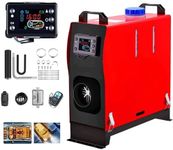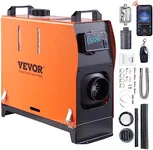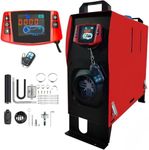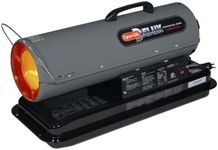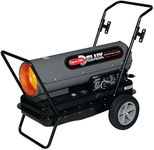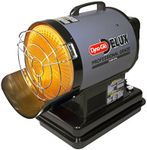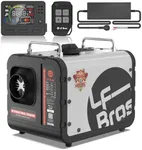Buying Guide for the Best Diesel Space Heaters
Choosing a diesel space heater can make a big difference in how comfortably and efficiently you heat large spaces like workshops, garages, or construction sites. The right heater will depend on the size of the area you need to warm, how portable you need the unit to be, and the safety features you require. Understanding the key specifications will help you match a heater to your needs, ensuring you get reliable warmth without wasting fuel or risking safety.Heating Capacity (BTU or kW)Heating capacity tells you how much heat the heater can produce, usually measured in BTUs (British Thermal Units) or kilowatts (kW). This is important because it determines how large an area the heater can effectively warm. Lower capacity heaters (up to 30,000 BTU or 8 kW) are suitable for small workshops or garages, while medium capacity (30,000–100,000 BTU or 8–30 kW) works for larger spaces or open areas. High capacity heaters (over 100,000 BTU or 30 kW) are best for very large or drafty spaces. To pick the right one, estimate the size of your space and consider how well it’s insulated—bigger, less insulated areas need more heating power.
Fuel Tank SizeThe fuel tank size tells you how much diesel the heater can hold, which affects how long it can run before needing a refill. A small tank (under 5 gallons or 20 liters) means more frequent refills but a lighter, more portable unit. Medium tanks (5–10 gallons or 20–40 liters) offer a balance between runtime and portability. Large tanks (over 10 gallons or 40 liters) allow for extended operation, which is useful for overnight or all-day heating. Choose a tank size based on how long you need the heater to run without interruption and how easy it is for you to refill it.
PortabilityPortability refers to how easy it is to move the heater around. Some heaters are compact and lightweight, making them easy to carry or wheel from place to place, while others are larger and may require more effort to move. If you need to heat different areas or move the heater frequently, look for models with handles or wheels. If the heater will stay in one spot, portability is less important.
Ventilation RequirementsDiesel space heaters can be direct-fired (unvented) or indirect-fired (vented). Direct-fired heaters release exhaust into the space, so they require good ventilation and are best for open or well-ventilated areas. Indirect-fired heaters vent exhaust outside, making them safer for enclosed or poorly ventilated spaces. Consider where you’ll use the heater and how much ventilation is available—choose indirect-fired for indoor use and direct-fired for outdoor or open spaces.
Safety FeaturesSafety features can include automatic shut-off if the heater tips over, overheat protection, and flame-out sensors. These features are important for preventing accidents and ensuring safe operation, especially if the heater will be used in busy or unattended areas. If safety is a top concern, look for models with multiple safety features and clear certifications.
Noise LevelNoise level refers to how loud the heater is when running. Some diesel heaters can be quite noisy, which might be distracting in quiet environments. If you’ll be working nearby or need a quieter workspace, look for models that are designed to operate more quietly. If noise isn’t a concern, this spec may be less important.
Ease of MaintenanceEase of maintenance covers how simple it is to clean, service, and replace parts on the heater. Some models have easy-access panels and simple filter systems, while others may require more effort to maintain. If you prefer low-maintenance equipment or don’t have much experience with mechanical upkeep, look for heaters that are known for easy maintenance.

